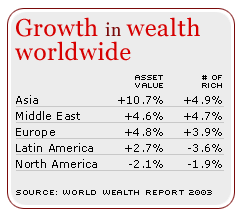
The major geo-socio-politico-economic movements in this era we find ourselves in:
1. the softening of the west in education and free market economics since the late 60s;
2. the demise of the Christian ethic, Calvinistic work ethic and world view;
3. the rise of tolerance and normalization – of homosexuality, teenage sex, drugs – things which wouldn’t have been countenanced thirty years ago;
4. the rise of China and the beginnings of
their hegemony, never forgetting Deng Xiao Ping’s maxim – “hiding brightness, nourishing obscurity and biding our time”;
5. the entry of Russia, China and India into free, world market economics;
6. the increased dependence on
oil as political power; 7. the lack of major world crises now being compensated for by the Finance, as it was in the Crimean, the two World, the Korean and the Vietnamese conflicts;
8. the rise and spread, in the west, of Islam;
9. the militarization and restructuring of society according to global principles – military presence on the streets, the coordination of data processing on individuals through credit and ID cards.;
10. the rise of the ‘terrorist’ through a system of provocation in world troublespots – stirring the pot, in other words;
11. the building of huge dams and the damming up of the world’s
water supplies for rationing out [this one’s still a sleeper but will come to fruition about 2015] ;
12. the ‘village-ization’ of people, restrictions on mobility, gradual ordering of the internet, and the turning in of people onto important issues such as Big Brother, American Idol and so on. In Soviet times it was ‘old cinema’ with that feel-good factor.
Check out
Sino-Kazakh military manouevres.










 The major geo-socio-politico-economic movements in this era we find ourselves in:
The major geo-socio-politico-economic movements in this era we find ourselves in:
 Intéressant pour un homme anglais, au sujet du trench:
Intéressant pour un homme anglais, au sujet du trench: Agent Smith, in the Matrix, said:
Agent Smith, in the Matrix, said: